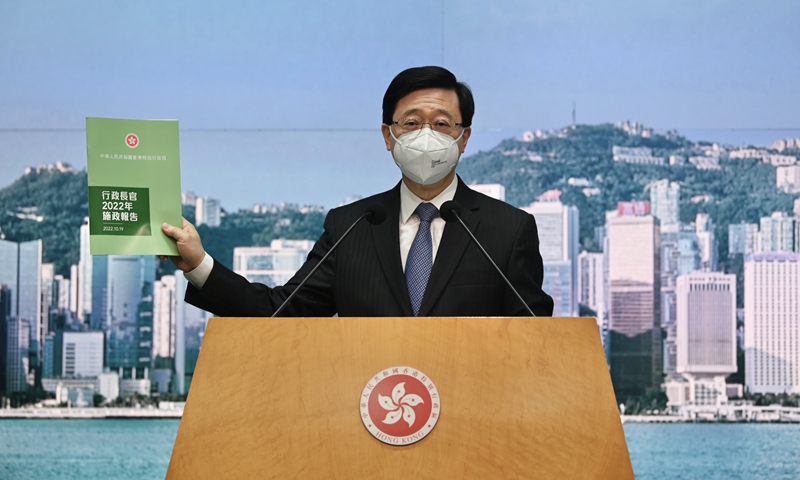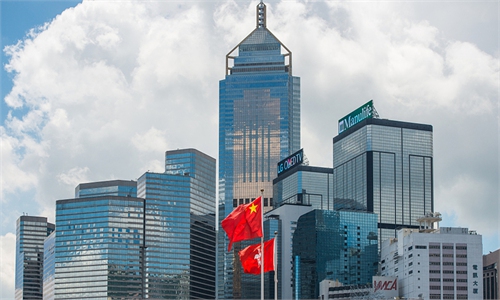Hong Kong CE John Lee delivers his first policy address, aiming at enhancing city’s competitiveness

Hong Kong's Chief Executive John Lee Ka-chiu shows his first policy address to the press on October 18. Photo: IC
Hong Kong's Chief Executive John Lee Ka-chiu delivered his first policy address at the Legislative Council on Wednesday morning, rolling out a series of measures in regard to attracting global talents, enhancing the city's competitiveness as an international financial hub, and further integrating into the country's overall development plan.
The city's economic recovery momentum has been affected by the epidemic rampage, struggling global economic recovery, inflation, trade and geopolitical conflicts, as well as waves of interest rate hikes and monetary tightening, while under One Country, Two Systems, Hong Kong has the advantage of connecting the Chinese mainland with the world, Lee said at the policy address. National key strategic plans such as the 14th Five-Year Plan, the Greater Bay Area (GBA) construction, and the Belt and Road Initiative all provide opportunities to Hong Kong, he said.
President Xi Jinping's earlier visit to Hong Kong SAR and his speech there have become the blueprint of Lee's policy address, the CE said, noting that the city is now at the critical stage of transitioning from chaos to order and prosperity and he will lead the governing team to work on the city's growth plan.
The first policy address since Lee became the CE aims to enhance the city's competitiveness, attract more talents and investment, and fix the social and economic problems such as housing woes. Over the past two years, the city lost about 140,000 local labor population, and the government has rolled out a series of measures to attract talents including those from abroad.
The government will establish the Office for Attracting Strategic Enterprises, led by the HKSAR Financial Secretary for attracting enterprises from the mainland and overseas by offering them facilitation and one-stop services, setting up a co-investment fund with HK$30 billion from the Future Fund to attract businesses. Qualified talents from outside Hong Kong who became permanent residents will receive a refund on extra stamp duty, the CE said.
The Hong Kong government also eases visa restrictions for talents by issuing two-year visa for those graduating from the world's top universities or those with annual salaries of $25 million or above, with no limit on the quota, according to the policy address.
In optimizing government's investments, Lee said a new investment corporation - Hong Kong New Investments Corp Ltd - will be set up to consolidate the Hong Kong growth portfolio, the Greater Bay Area investment fund and so on in order to promote the development of industries and the economy.
Also, a new Policy Unit of the Chief Executive will be set up within this year to enhance the research and suggestions on government policies, including in-depth studies on mainland and oversea situations with broad and global perspectives.
Fixing the housing woes is the top priority on the HKSAR government's agenda, Lee said, who pledged to make breakthroughs in housing supply to tackle the long-term shortage. In the next five years, there will be about 30,000 simple public housing units, which will increase housing supply and shorten residents' waiting period.
Lee also announced six major transport projects including new railways and highways to enhance the Northern Metropolis - an ambitious plan to develop the land near the Hong Kong-Shenzhen boundary area. The CE vowed to fully advance the construction of the Northern Metropolis by setting up special steering committee and advisory committee, and planning on working details and guidelines in 2023.
In order to enhance public awareness about national security, Lee announced plans to change the name of Basic Law Promotion Steering Committee into the Steering Committee for the Promotion of the Constitution and the Basic Law, reflecting the Hong Kong government's determination and focus on promoting the Constitution.
To accurately implement the original meaning of the National Security Law for Hong Kong legislation, the HKSAR government will further improve the legal system of safeguarding national security and enforcement mechanism, including promoting the legislative preparation for Article 23, regulations on online and offline crowd funding activities, legislation to improve key infrastructure network and complete the advisory research on handling false information for policy consideration.
In advancing the national security education in campus, new permanent teachers in public schools must pass the Basic Law test from the next school year, and the test will extend to all schools under the Direct Subsidy Scheme from the next school year, covering the Basic Law and the National Security Law for Hong Kong. The test for kindergartens participating in the Kindergarten Education Program covers the Basic Law and the National Security Law for Hong Kong.
In a two-and-a-half-hour policy address, Lee also mentioned the importance the government attaches to the Hong Kong youth, as the Home and Youth Affairs Bureau will publish its first youth development blueprint within this year. The major focuses include cultivating the Hong Kong youth as a patriotic generation with global perspectives and correct thinking, who will make contribution to Hong Kong, the nation, and the world.
As his first policy address, Lee said he hopes to tell Hong Kong stories well to the world. Given the complex international political environment, the foreign forces have been constantly smearing and slandering the country and distorting the situation in Hong Kong.
In terms of fighting COVID-19, Lee stressed five directions including "not lying flat," reducing severe cases and deaths, protecting high-risk groups, and using scientific and balancing economic development and transmission risks.
He also mentioned that the government will further ease epidemic restrictions once conditions allow and will talk with mainland authorities on measures including reversal of quarantine and increasing the quarantine quota in neighboring Shenzhen.

